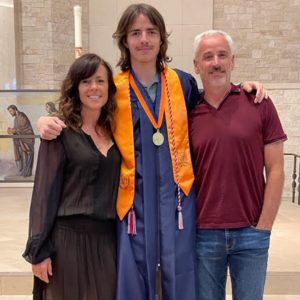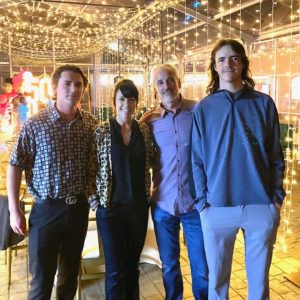Riordan Clinic Cancer Survivor Looks To Help Others
By Melody Spurney
Amye Williamson’s last day of her extended treatment at the Riordan Clinic in Overland Park helped reinforce her desire to expand access to the clinic for more patients.
That day, she met a young mother newly diagnosed with breast cancer who was beginning her journey with the Riordan Clinic as Amye was ending hers. Amye and other patients recognized the woman’s fear and shared empathy with her through their own experiences.
“I think we were able to bring a lot of comfort to her. She shed a lot of tears that day, but it was such a safe space for her and us, too,” Amye said. “We all came together and did our best to reassure her that she was on the right path. The one prayer that we all have is that God will light our path and give us the courage to follow that.”
Amye, 52, of McKinney, Texas, was diagnosed with stage 3B colon cancer in November 2021. After having 20 centimeters of her colon and 27 lymph nodes removed on December 14, conventional oncologists recommended a “pretty extreme” chemotherapy regimen, she said. After doing some research on her own, she realized that the treatment plan she was being offered was the same one that would be recommended for someone 20 years older with comorbidities.
“That was what turned a light bulb on in my head that this might not be right for me,” she said.
Coping with a Cancer Diagnosis
Amye said that her family went through a bit of a dark period after her initial diagnosis.
“When cancer hits, it doesn’t just hit one person. It hits the whole family,” she said.
She described her first oncology visit as “kind of like walking through a horror movie.”
Amye and her husband, Jerry, were frustrated with the conventional care they were being offered. In addition to feeling that the care plans were not patient-based or focused on best outcomes, they also realized that conventional providers can be pressured into a standardized care model. In Texas, she said that is a legal term and that doctors who vary from traditional therapies can be in jeopardy of losing their medical licenses.
She said her conventional oncologist couldn’t discuss nutrition, protecting her immune system, or best outcomes, which was a red flag for her and for Jerry.
“He was just as disturbed as I was,” Amye said.
Amye said that her diagnosis and initial oncology appointments prompted her to look for other options and she found Dr. Lucas Tims, ND, FABNO, at the Riordan Clinic.
“By the grace of God, it landed me on a video that was made by Dr. Lucas,” she said.
She was impressed by Dr. Lucas’ openness and his belief that traditional care and integrative oncology can work together and his focus on treating the whole person, terrain testing, and learning why cancer was able to take hold in the first place.
“It just clicked. It made sense to me,” she said.
Amye said she shared information about Riordan Clinic with her husband, who was supportive of her interest in the clinic. He also sensed her need for a break to clear her head and regain focus, so they traveled to a beach in Alabama for a week. Although she described herself as a generally level-headed and grounded person, a lot was thrown at the family in a short amount of time.
“Thank God my husband had the rock-solidness to get me out of here and get me to a place where I could get my head on straight and move forward with what was going to be right for us,” she said.
After returning home for two days to check on their sons Reece, 21, and Chad, 18, Amye and Jerry went to Overland Park for Amy’s initial visit in February.
Riordan Approach to Care
Amye’s first visit to the Riordan Clinic lasted about four days and included lab work, a visit with Dr. Lucas, and several treatments.
“The moment I walked into the building I knew I was where I was supposed to be,” she said.
Amye appreciated how straightforward Dr. Lucas was in explaining care plans and options to his patients. After two visits with a conventional oncologist in Texas that Amye described as “horrible,” she and her husband were comforted by and appreciative of the time Dr Lucas spent with them. “There was no clock-watching or interruptions during our almost two-hour intake appointment,” she said.
“He just talks to his patients. It’s not filled with a bunch of terminology or explanations that are hard to understand. He just lays it all out. Everyone should have access to a doctor like that,” she said.
After six weeks, Dr. Lucas and Amye had a follow-up Zoom call to update her on lab results. Initially, Amye said she was a little anxious about the call. She said he told her that outside of the tumor, everything else was “unremarkable.”
“In any other circumstance, I am not unremarkable. But in that circumstance, I was glad to get that answer,” she said.
Amye also got support from her personal physician, who also works in integrative medicine. She listened in on Amye’s follow-up call with Dr. Lucas.
“She really wanted to know how she could best support me through this process Dr. Lucas created,” Amye said.
Her next step was a return trip to Overland Park for an extended stay and intensive detox of mold, pesticides, plastics, and other substances that may have caused her immune system to become dysfunctional beginning a decade or more ago when she was diagnosed with the autoimmune condition of Hashimoto’s thyroiditis.
Amye spent up to four hours at the Riordan Clinic daily for 10 days during her stay in Overland Park. Her treatments included ultraviolet blood irradiation with ozone, mistletoe injections, high-dose vitamin C IVs, alpha lipolic acid, and sessions in the infrared sauna.
“I just felt 100 percent energized,” she said of her treatments.
Amye’s PET scan following her surgery showed no sign of cancer, and her follow-up care routine currently includes a low-dose naltrexone and high-dose vitamin C IVs, which she is able to do at her primary care physician’s office.
Lifestyle Changes
Following her autoimmune diagnosis a decade ago, Amye had emphasized a relatively healthy diet and exercise regimen. As a half marathon runner, she had experienced a heat-related injury last summer and had modified her exercise routine before her cancer diagnosis.
She has refocused on that and is now working out six days a week with a focus on building muscle in addition to cardio. She has refocused her attention on nutrition, too, moving to a more plant-based diet with a 90/10 percent plant ratio and eliminating alcohol.
In addition, her family is preparing to install an ozone filter at home to cut down on plastic contamination from pipes.
Amye is also the only female on her team at Skechers USA, and she works hard to maintain a balance in her work and home life relationship.
Her experience at the clinic with the gratitude journal that is included in patient welcome packets also helped her, and she liked it so much she has given copies of the journal to friends as gifts.
“When I start having thoughts of negativity I can very quickly flip that over to gratitude, and that has been tremendously helpful for me,” she said.
Mentoring Others
The staff and fellow co-learners inspired Amye to think of ways to help other patients, especially those like the young mother who are just beginning their healing journeys. Patients receiving IV therapies at Riordan Clinics often find camaraderie in the group spaces where they receive their treatments.
“There has to be a way for us to come together outside of those chairs at the clinic and to help each other and share information in a way that can be helpful,” she said. “My case is my case, but if someone can take one speck of that and use it to make things better for themselves, then why wouldn’t I share that.”
Amye has preliminary ideas for a patient-to-patient mentoring program, a group forum, and developing a scholarship program to financially assist those who need it.
“Some people never have access to this kind of care,” she said.
She also said that someday she would like to help bring a Riordan Clinic to north Texas, noting that even in the Dallas metro-area she couldn’t find the kind of care that she received in Overland Park.
“Don’t walk. Run to the Riordan Clinic. I firmly believe that the process of understanding what caused cancer is as important as treating cancer. Taking a whole human body approach is more important than carpet bombing your whole system with a substance that potentially could cause more harm than good,” Amye said. 






